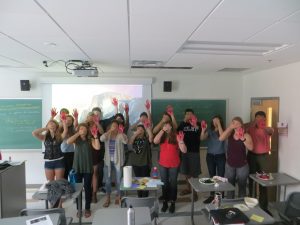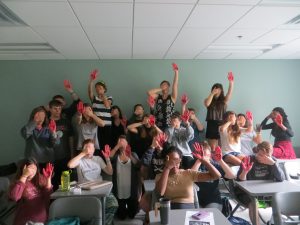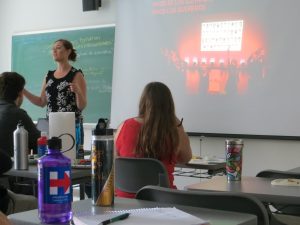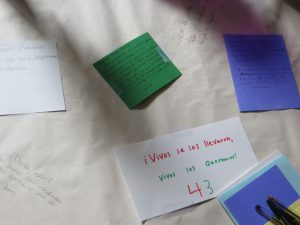We mourn the attack in Berlin and stand with all who work towards peace.
Category: Fall 2016 More
 Professors Alexander Prokhorov and Elena Prokhorova have published a pioneering book that examines Soviet film and television of the 1970s as mature industries articulating diverse cultural values via new genre models. During the 1970s, Soviet cinema and television developed a parallel system of genres where television texts celebrated conservative consensus while films manifested symptoms of ideological and social crises. The book examines the genres of state-sponsored epic films, police procedural, comedy and melodrama, and outlines how television gradually emerged as the major form of Russo-Soviet popular culture. Through close analysis of well-known film classics of the period as well as less familiar films and television series, this groundbreaking work helps to deconstruct the myth of this era as a time of cultural and economic stagnation and also helps us to understand the persistence of this myth in the collective memory of Putin-era Russia. This monograph is the first book-length English-language study of film and television genres of the late Soviet era.
Professors Alexander Prokhorov and Elena Prokhorova have published a pioneering book that examines Soviet film and television of the 1970s as mature industries articulating diverse cultural values via new genre models. During the 1970s, Soviet cinema and television developed a parallel system of genres where television texts celebrated conservative consensus while films manifested symptoms of ideological and social crises. The book examines the genres of state-sponsored epic films, police procedural, comedy and melodrama, and outlines how television gradually emerged as the major form of Russo-Soviet popular culture. Through close analysis of well-known film classics of the period as well as less familiar films and television series, this groundbreaking work helps to deconstruct the myth of this era as a time of cultural and economic stagnation and also helps us to understand the persistence of this myth in the collective memory of Putin-era Russia. This monograph is the first book-length English-language study of film and television genres of the late Soviet era.
Jessica Armstrong
Over the summer between my junior and senior years at William & Mary, I completed a chemistry research internship at the University of Cologne through the DAAD RISE program. Throughout the summer, I worked with a PhD student who advised my project. Every morning, I met with him to discuss my goals for the day and then set up any reactions that I needed to run. Because each reaction stirred for several hours, I often left them running over our lunch break.
My lab group went to lunch at the Mensa every day at 11:30AM. Most days, our group leader joined us, providing me with an excellent opportunity to get tips for conducting my research as well as travelling around Cologne and other German cities. Our trip to the Mensa quickly became an integral part of my day.
After lunch, I returned to the lab, finished up the reaction I was running, and worked it up so that the product could be stored overnight until I returned the next morning. Often, at the end of the workday, I simply hopped on a train back to my apartment, prepared dinner for myself, and planned out the upcoming weekend’s excursion to another city. However, my favorite memories from my time in Cologne are times when I deviated from routine and met up with other interns to have dinner, drink a Kölsch, watch a Fußball game, and hang out. It was one of these evenings that I discovered Döner Kebap—the sandwich that has taken Germany by storm and stolen my heart.
Apart from my evenings exploring Cologne, I have incredible memories of all of the weekends I spent travelling in Germany. I competed in a half marathon in Hamburg, learned about Germany’s long history in Berlin, and sampled Bavarian sausages and pretzels in Munich. By the end of the summer, I felt confident that, if dropped in any random city, I could figure things out. Though I did experience some challenges both in research and while travelling during my summer in Germany, each challenge forced me to learn life lessons that I never could have learned in a classroom.
William Kelly
I am a junior majoring in German Studies at William and Mary. I am currently spending a year abroad studying Germanistik at the Westfaelische Wilhelms Universitaet in Muenster. Last year, I realized I would need to be proactive about improving my language skills before coming to school this Fall. I first applied to William and Mary summer programs in Germany, but quickly realized these programs were not financially sustainable for me. I immediately began searching for other options, and I came across a program called WWOOF. WWOOF (World-Wide Opportunities on Organic Farms) provides its members volunteer opportunities working and living on organic farms. This means you work with a family for free, in exchange for food and stay.
This program sounded great for me. I could live in Germany for the summer, stay active and outdoors, and work on my language, all for the price of a plane ticket (plus some spending money). I started emailing families in the beginning of the Spring, and by the time the school year ended I was set up to work on two farms in Germany for the Summer! I decided to split time between two farms in June and July, one in the north of Germany and one in the south, to expose myself to different dialects. I ended up having amazing experiences on both farms. Some of the highlights include: Living with and bonding with families and fellow WWOOFers, taking care of farm animals (sheep, goats, chickens, etc.), landscaping, starting a new garden, learning to cook more for myself, traveling locally, experiencing a new landscape, canoeing, fishing, and of course improving my German.
TIPS:
- Start emailing early and often. Farms are receiving emails all the time and can only take so many people at a time. Getting connected early also gives time to set up what you will expect of each other as Host and Guest. Emailing in German also helps.
- (Maybe the most important part)
EXPECTATIONS: There should be no confusion about the living situation, amount and type of work expected, free time, etc. Remember that this program is completely voluntary on both ends. If one side is not meeting the expectations that were set, then either party has the right to end things.
- Try to find a farm with other WWOOFers or bring a friend! Farm life can become slow at times if you are the only person your age or the only one working every day. It would have been so much fun if I brought a friend, but the other WWOOFers and families I met were amazing and I learned about a variety of different cultures.
- Have an open mind! There were times when, due to language or cultural barriers, misunderstandings arose. Be understanding and know that things are not always how they initially appear.
(or Building Regional Connections Through Scholarly Exchange)
On the final day of this fall semester I had the opportunity to participate in a symposium just up the road in Charlottesville, at The University of Virginia. The symposium, “Post-Humanism in the Anthropocene,” was sponsored by the Mellon Foundation and UVA’s Institute of the Humanities & Global Cultures. It was carefully organized by Enrico Cesaretti, Associate Professor of Italian
at UVA and a 2016-2017 Mellon Humanities Fellow. While my journey was short, other  speakers traveled from all over North America to participate. Three successive panels took place throughout the day, according to the themes of “Questioning Boundaries,” “Energies, Ecologies, Matters,” and “Mediterranean Narratives Between Bios and Zoe.” While the majority of the speakers were Italian scholars, we were also joined by colleagues in German, Comparative Literature and English. All symposium participants were united by a shared interest in the Environmental Humanities, whether that surfaced as a focus on textual representations of landscape, petroleum cultures, or Pythagorean philosophy in contemporary film. We enjoyed fabulous conversations into the evening and made plans for future collaborative work, such as at the 2017 biennial conference of the Association for the Study of Literature and the Environment. I was especially pleased to connect with colleagues from nearby institutions, The University of North Carolina at Chapel Hill and UVA, and look forward to continuing our work together in the future.
speakers traveled from all over North America to participate. Three successive panels took place throughout the day, according to the themes of “Questioning Boundaries,” “Energies, Ecologies, Matters,” and “Mediterranean Narratives Between Bios and Zoe.” While the majority of the speakers were Italian scholars, we were also joined by colleagues in German, Comparative Literature and English. All symposium participants were united by a shared interest in the Environmental Humanities, whether that surfaced as a focus on textual representations of landscape, petroleum cultures, or Pythagorean philosophy in contemporary film. We enjoyed fabulous conversations into the evening and made plans for future collaborative work, such as at the 2017 biennial conference of the Association for the Study of Literature and the Environment. I was especially pleased to connect with colleagues from nearby institutions, The University of North Carolina at Chapel Hill and UVA, and look forward to continuing our work together in the future.
-Monica Seger, Assistant Professor of Italian Studies
During the summer of 2016, Prof. John ‘Rio’ Riofrio embarked in the adventure of co-leading our W&M-sponsored program in Santiago de Compostela (Spain); an interdisciplinary, international, and transformative experience.
 Like people since the Middle Ages, Prof. Riofrio, Prof. Allar (Theater, Speech & Dance), and 9 valiant W&M students joined pilgrims from all over the world and covered 197 miles (311 kms) over 13 days, going from León and ending in Santiago de Compostela. While medieval pilgrims were motivated by the tradition that the remains of Saint James the Apostle were in Compostela, our W&M group set out in a challenging interdisciplinary pedagogical experience that included analyzing architectural examples, as well as art and graffiti found along The Way, and classes led by Profs. Riofrio and Allar before and after the actual physical transit along the Camino. Students were also able to reflect on their experience by mapping their trajectory; you can read the thoughts shared by Brooks Henne, Martha Rose Oordt, Quinn Reiley, and Alex Wingate.
Like people since the Middle Ages, Prof. Riofrio, Prof. Allar (Theater, Speech & Dance), and 9 valiant W&M students joined pilgrims from all over the world and covered 197 miles (311 kms) over 13 days, going from León and ending in Santiago de Compostela. While medieval pilgrims were motivated by the tradition that the remains of Saint James the Apostle were in Compostela, our W&M group set out in a challenging interdisciplinary pedagogical experience that included analyzing architectural examples, as well as art and graffiti found along The Way, and classes led by Profs. Riofrio and Allar before and after the actual physical transit along the Camino. Students were also able to reflect on their experience by mapping their trajectory; you can read the thoughts shared by Brooks Henne, Martha Rose Oordt, Quinn Reiley, and Alex Wingate.
For more details on this experience, please check the article by Kate Hoving, A New Curriculum Transforms a Familiar Path, published in the latest issue of the journal of the Reves Center World Minded, 9.1 (Fall 2016): 11-14.
***
For more information on our W&M-sponsored summer program in Santiago de Compostela, please visit the website of the Reves Center. For summer 2017, the application deadline is February 6, 2017.
 The Chinese Program presented the talk entitled “Journeys to the West: The Many Adventures of China’s Monkey King” on November 3, 2016. The speaker is Professor Robert E. Hegel, Liselotte Dieckmann Professor of Comparative Literature and Professor of Chinese at Washington University in St. Louis. He is a world-renowned specialist in the narrative and theatrical traditions of late imperial China.
The Chinese Program presented the talk entitled “Journeys to the West: The Many Adventures of China’s Monkey King” on November 3, 2016. The speaker is Professor Robert E. Hegel, Liselotte Dieckmann Professor of Comparative Literature and Professor of Chinese at Washington University in St. Louis. He is a world-renowned specialist in the narrative and theatrical traditions of late imperial China.
In the talk, Professor Hegel discussed Journey to the West, one of China’s greatest novels from the sixteenth-century. Its central figure is the Monkey King who is both prankster and serious Buddhist pilgrim, monstrous warrior and interpreter of difficult philosophy. He also plays a major role in the numerous literary sequels, films, television dramas, video games, and other spin-offs of the novel–each with a slightly different take on his journey to bring South Asian scriptures back to China. The major theme of the talk is the complexity of culture how many elements can be inextricably intertwined–specifically fiction, theater, and religious belief and practice in the case of the Monkey King.
This talk was attended by more than 100 audiences from students and faculty at W&M as well as Williamsburg community members. This event was organized by Chun-yu Lu and was generously sponsored by WMCI, Reves Center, and Arts & Sciences.
By Prof. Christina Baker.

Adam Taub is not only a documentary filmmaker with many awards and credits to his name, but is also a highly regarded practitioner in the world of Latin/o dance. He joined William & Mary on November 1st, 2016 to give one of his innovative multimedia presentations and Dominican bachata dance workshops. Combining multimedia clips with embodied knowledge, Adam’s work came alive and was greatly enjoyed by his audience members.
With over 70 people in attendance, this unique opportunity brought together faculty, students and community members. From the community, dancers traveled from Norfolk to learn from Adam’s embodied pedagogy while local Dominicans came to reminisce about home. Faculty and staff from Theatre, Speech and Dance, Hispanic Studies, Latin American Studies and the School of Education sat amongst students from Hispanic Studies, Latin American Studies, Film & Media Studies and organizations like the Monroe Scholars, Latin American Student Union and William & Mary Salsa Club. On the dance floor, students, faculty and community members got to know one another as they rotated around the room practicing their new dance moves. Bridging disciplines and conversations, Adam’s talk and workshop created a rich interaction for all.

Beyond his talk and dance workshop Adam’s presence was felt on campus throughout the week as he made appearances and offered guest lectures in courses such as Hispanic Studies 207: Cross-Cultural Perspectives, American Studies 470: Blatinx: Black Identities in Latin America and Latin American Studies 350: Latin American Cultures, Society and Politics. His film, Duke of Bachata (2009) was also screened on Thursday, November 3rd, in Botetourt Theatre.
This event was made possible by the support of the Reves Center for International Studies, the Roy R Charles Center for Academic Excellence, Dean Homza, Hispanic Studies, Latin American Studies, Film & Media Studies, Africana Studies, and Anthropology.

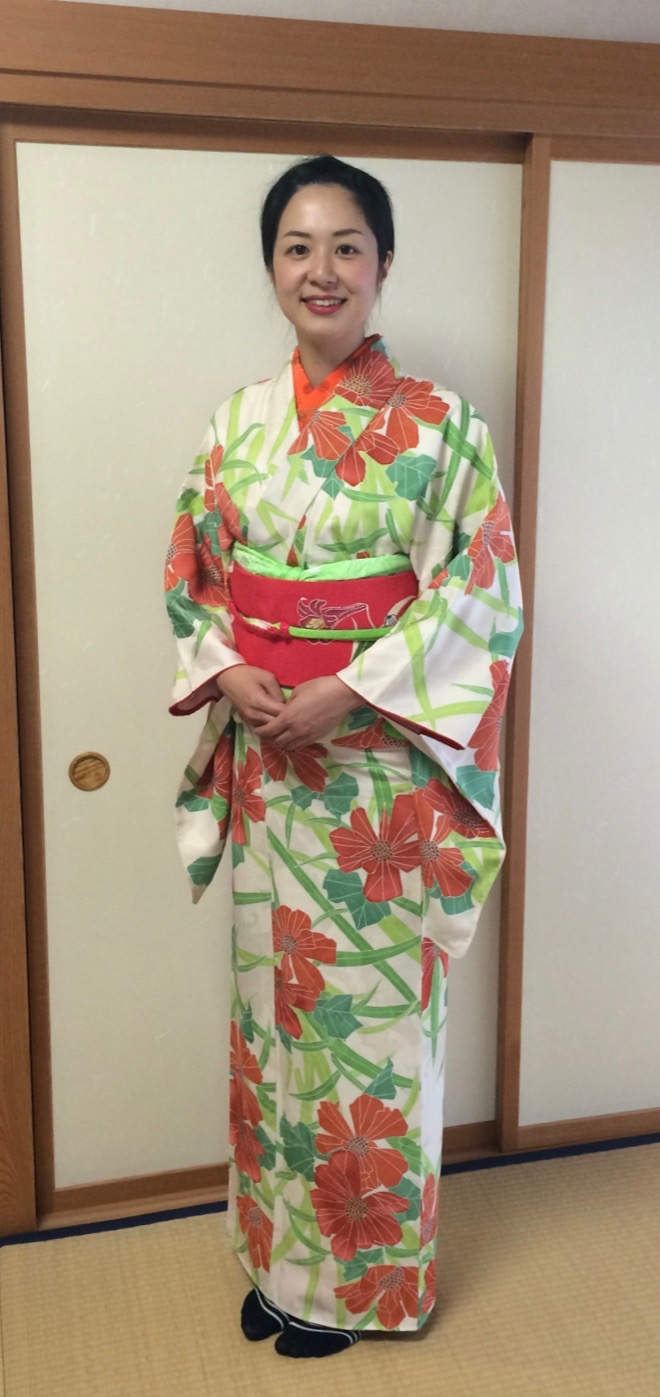
 I was born and reared in Chiba Prefecture, Japan, where I flourished and derived my desire for a sound education and enriching life experiences. I sought my bachelor’s degree from Showa Women’s University and finished my master’s degree at Akita International University (AIU), where I studied Japanese Language Education. Akita International University is in Akita prefecture and is a proud partner institution with The College of William & Mary (W&M) in Williamsburg, VA.
I was born and reared in Chiba Prefecture, Japan, where I flourished and derived my desire for a sound education and enriching life experiences. I sought my bachelor’s degree from Showa Women’s University and finished my master’s degree at Akita International University (AIU), where I studied Japanese Language Education. Akita International University is in Akita prefecture and is a proud partner institution with The College of William & Mary (W&M) in Williamsburg, VA.
In addition to the natural setting and great foods for which Akita prefecture is known, it also boasts a university in which all classes are offered in English and all students are required to study abroad for a year. In fact, for those 200+ international students who come each year, the Japanese studies program provides not only Japanese language courses, which are taught in Japanese, but also content courses related to Japan that are offered in English.
While enrolled in University, I had many opportunities to practice Japanese language teaching with those international students. However, I quickly discovered that teaching Japanese was surprisingly difficult. Thus, I began to study Japanese Language Education to facilitate my teaching skills. In addition to my academic courses, I also learned how to wear kimono, an elegant example of traditional Japanese attire. As a result of practicing kimono, I subsequently received prizes in Kimono competitions.
Now, I am living with students in the Japanese Language House and working at W&M as a Language House tutor. My main job includes organizing events on a regular bi-weekly schedule, activities such as cooking lessons and cultural functions. For cooking nights, we have made dumplings, hand-rolled sushi, and other Japanese foods. Also, I have hosted collaborative cooking nights with other language houses. Our cultural events have included making chopstick rests and discussing present working conditions in Japan with Japanese MBA students.
During my time here as the house tutor, I’d like to continue introducing more cultural aspects about Japan to students as well as supporting those students as they improve their Japanese speaking skills.

La Fete de la Recherche is an annual conference that showcases our students’ research projects. It is an opportunity for students to present to their professors and peers the research they are doing for an honor thesis, courses, internships or, projects completed during the summer program in Montpellier. Presenters explain their motivations, research process, discoveries, and also the challenges of pursuing research.
Presentations are either in French or English and cover a variety of topics and different aspects of French and Francophone cultures including literature, public spaces, museums and monuments, films, music and more.
La Fête de la Recherche is also the opportunity to meet your French professors and your peers, ask questions about courses, study abroad programs, scholarships, research opportunities, and the Francophone community on campus.
This year’s Fête de la Recherche on September 30 included many great speakers, including a round table discussion on French beyond William and Mary featuring successful alumni Catherine Kang (Ed.M. in Human Development and Psychology student at Harvard), Katie Gehron (Country Desk Officer, Peace Corp, Washington DC), Kevin Lonabaugh (Second-year pharmacy resident in family medicine and pediatrics,University of Oklahoma, OK), and Christian Bale (White House legislative analyst, Washington, DC).
Sean Schofield from W&M’s Career Center shared some great information about the value of cultural literacy and critical thinking.
Attendees heard about some very exciting Undergraduate Research from students who participated in the IFE and Montpelier programs:
Zarine Kharazian – « Une exception technoculturelle: France’s Approach to the Problem of Digital Eternity. »
Lorraine Pettit – « Le tramway: une traversée de la ville et de la culture »
Paul Naanou – « War, Memory, and Trauma: Lebanese Francophone Literature. »
Last but not least, Lydia Funk and Rosie Vita spoke about their experiences in Montpellier!
For more information about this event visit our website:

By Prof. Christina Baker.
The evening of September 26th, 2014, 43 students of Ayotzinapa, in the state of Guerrero, Mexico disappeared. These “normalista” students were studying to become teachers in Mexico and were not only being trained in pedagogy but also leftist political ideals. The night of September 26th, this group of 43, along with many others, embarked on a journey to Mexico City to protest education reforms as well as participate in commemorating the students massacred in Mexico’s Plaza de Tres Culturas on October 2, 1968.

The search for these missing 43 students has unearthed numerous unmarked mass graves in Mexico and many remains of other missing and disappeared citizens. However, the search has yet to produce any evidence of these students. There have been numerous investigations, findings and reports, though no concrete answer exists. The state blames the students and cartels. The families blame the state. The students remain missing and no one has admitted guilt.

In honor of these missing 43 students, William & Mary students from Prof. Christina Baker’s HISP 207: Cross-Cultural Perspectives, in collaboration with Pablo Moral of the Casa Hispánica observed the loss. The students discussed news articles, posed questions and thought critically about how such tragedy could happen. The students, lastly, engaged in an act of mourning and remembrance. The students wrote letters to the missing 43 in solidarity with them and wishing them a safe return. They also participated in an act all too familiar on the streets of Mexico: Counting in unison to 43 and chanting the refrain “Vivos se los llevaron, vivos los queremos” (‘Alive they were taken, Alive we want them’).
[Full article by Tami C. Back here]
Ann Marie Stock, professor of Hispanic studies and film and media studies, has been named the inaugural William & Mary Libraries Faculty Scholar.

In this new position, Stock will partner with library colleagues on several initiatives. Principal among them is the creation of a digital archive to inventory and make accessible the Cuban film materials she has been compiling and creating for some 30 years. The first component of this digital humanities project, an online exhibit of Cuban film posters, is underway. The physical exhibit, “UnMade in Cuba: Carteles de Cine,” is on display in the Botetourt Gallery in Swem through the fall semester.
Stock confesses to being “thrilled” with this new opportunity. She has served in a variety of capacities during her 23 years at W&M — as director of both Hispanic studies and film and media studies, associate dean and acting dean of international affairs, director of the Reves Center for International Studies and a leader in developing undergraduate research opportunities in the humanities.
As part of the Bellini Colloquium series for fall 2016, Prof. Silvia Tandeciarz shared her research with colleagues and students. On September 15, Prof. Tandeciarz presented a talk entitled “Citizens of Memory: Recollection and Human Rights in Post-Dictatorship Argentina,” based on her latest project.
“40 years after the military coup that ushered in the most brutal dictatorship of Argentina’s modern history, human rights activists, cultural practitioners and ordinary citizens continue to struggle to define its meaning. The tolls of this period are well known: thirty thousand disappeared; many more exiled and/or subjected to torture in clandestine detention centers; roughly five-hundred children born in captivity, taken from their biological parents and appropriated by Junta sympathizers to be raised according to its “Western and Christian” ideological principles; and a nation disciplined by the “Process of National Reorganization” whose regime of terror marked its transition from State to market.

“While this story of State terrorism is not unique to Argentina, or to Latin America, the advances in human rights prosecutions of the last decade have turned the nation into a model of transitional justice. This lecture focuses on practices of recollection helped to shape the contemporary landscape. The analysis seeks to illuminate the productive confluence of aesthetic considerations and human rights practices, as well as the sometimes more fraught uses of memory, that this case study makes evident. The central proposition is that the creative labor informed by recall in contemporary Argentina is key not only to the nation’s ongoing project of democratization, but to the formation of citizens dedicated to the collective expansion of present and future spaces of hope.
The Bellini Colloquium is a lecture series sponsored by the Department of Modern Languages and Literatures. It is named after the first Professor of Modern Languages at the College, Carlo Bellini, a native of Florence, Italy and close friend of Thomas Jefferson. Bellini taught French and Italian from 1779 until 1803, and holds the distinction of being the only Professor to stay in residence at the College when classes were suspended for two years during the Revolutionary War.
















